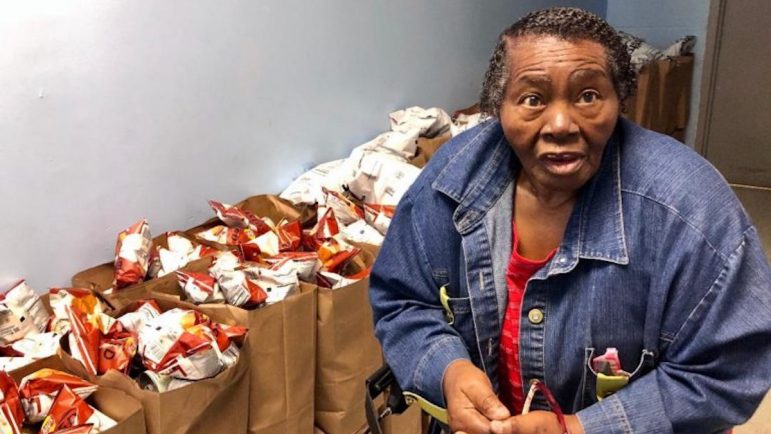As local families enter the holiday season, some are turning to food banks for the first time. The resulting higher demand has left some Birmingham-area food banks scrambling to keep food on the table for their clients.
Many face an uphill battle. Fewer donations, higher food prices and logistical issues are just some of the problems food banks have encountered since the start of the pandemic. Months later, those difficulties remain even as more people require food assistance.
Despite the food banks’ best efforts, sometimes it’s not enough.
“For the first time, this month we ran out of food before we could finish giving it to everyone who came by,” Ray Flynn, director of The Ministry Center at Green Springs, said last week. The center currently serves about 200 families a month. “The demand is getting greater, and the problem is getting larger,” he said.
Greater Birmingham Ministries faced a similar issue in November. It had to send more than 100 people away with instructions to come back the following week to receive food, according to Sarah Price, direct services coordinator at the ministries.
The ministries had to cut back its weekly food distribution in the spring, in part due to a lack of volunteers. Like many other food banks, Greater Birmingham Ministries has had to restrict the number of volunteers it takes on due to new safety protocols implemented for the pandemic. Months later, the food bank is still distributing food only every three weeks.
“I think it will be a good while before we can really get back to doing food as we used to,” Price said.
The number of people seeking assistance is only growing. Some are newcomers who have never been to a food bank before. Others have been jobless for months and worry that their unemployment benefits will soon run out.
The Community Food Bank of Central Alabama, which distributes food both directly to individuals and to smaller food banks in the region, has seen a sharp increase in demand, according to CEO Brett Meredith.
Before the pandemic, the food bank distributed roughly 1.1 million pounds of food a month. Now it is giving out almost 2.2 million pounds every month.
All of that food will add up to more than $2.5 million by the year’s end, Meredith said. Last year, the Community Food Bank spent $500,000 on food.
“The cost of food has gone up pretty significantly. There’s a shortage of aluminum for cans,” Meredith said. “So many people through the year — because of the pandemic — have been shopping in stores instead of eating out at restaurants. There’s a lot less food on the wholesale market.”
Fundraising Lags
Finding the money to meet the demand for assistance and to fund holiday programs remains a constant issue for charities, especially as the pandemic restricts their activities.
The Salvation Army, for example, normally hosts fundraisers for its Christmas season in late summer and the fall. This year, it had to cancel those events. It also is seeing lower donation levels from its iconic red kettles and bell ringers, who stand in front of stores during the holiday season.
“There seems to be less foot traffic going into the stores around the community. And people that are shopping … don’t carry cash anymore, especially with the pandemic,” said Charles Powell, the area commander of the Salvation Army in Birmingham.
Alabama has tried to assist its local food banks by providing monetary support. Last week, Gov. Kay Ivey announced she had allocated roughly $3.6 million in Cares Act funds for the Alabama Feeding Initiative, which will help reimburse food banks.
Meredith, who estimated that the Community Food Bank will likely receive about $1 million, said the funds will be “a shot in the arm for us to help.”
The Ministry Center at Green Springs has sought money from the state as well as local foundations. These grants, along with help from a donor, have supported the food pantry’s funds so far. But the center requires more assistance, especially from the federal level, according to Flynn.
“Nonprofits, food pantries offer a valuable and important service, but they are not able to meet the real demand that’s out there,” Flynn said. “Without some additional support through federal programs, special programs or whatever for food, it’s going to get worse.”
In the meantime, food banks are forging ahead with their holiday plans, intent on providing extra assistance to those who need it through the winter season.
At Greater Birmingham Ministries, that means distributing food, gifts and gift cards to 200 families as part of its annual Christmas program. Despite facing constant challenges over the course of the pandemic, Price said she is confident the Birmingham community will help the ministries provide for those families.
“I’ve been here doing this since 1983, and we have never had to turn away a family,” Price said. “I’m not about to start doing it this year, 2020.”

